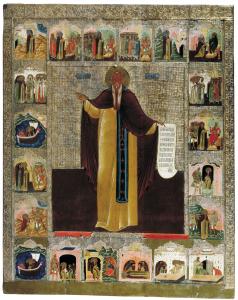
In his works, St. Maximos the Confessor indicated God’s desire for humanity:
In the beginning, the human being was created for this purpose: to ascend in desire to the Cause (aitia) and then, accordingly, to descend to the created things that follow the Cause, and thus, having rightly investigates these things with knowledge, to raise them up to their Creator. [1]
God intended humanity to be deified. God wanted humanity to join in with him, to partake of the divine nature. But the desire was not that humanity would just cleave to him. Humanity, by joining in itself with God and partaking of the divine life, would then act as he acts. That is, humanity would act out of love and seek to bring the rest of creation in union with God. If it did so, humanity would become mediators between God and the rest of creation.
God, however, did not force himself and his desires upon humanity. Rather, humanity was given the choice to either direct itself towards God, unite with him, and then to intercede for the world through the grace given to it after cleaving with God, or to direct itself towards creation, apart from God, to cleave to it, and in doing so, close itself off from the grace of God. Humanity chose unwisely. It did not cleave to God. It was distracted by the lesser beauty of creation and desired to merge with it, especially with its material side. Through its actions, humanity hurt itself. It became spiritually blind, losing the graceful light of God which is needed for a full, holistic perception of reality. Bound by its choice, humanity could not fulfill its purpos. Instead of lifting up creation, it lowered itself, becoming more like those parts of creation it was meant to elevate.
Nonetheless, God would not be detoured. God did not abandon humanity even though humanity abandoned him. He found a way to redirect humanity, helping it find its way back to him, after which it could then once again fulfill its role in creation. And he did this through the incarnation. As the Logos joined himself with humanity, he could fulfill the purpose of humanity in himself, and then allow the rest of humanity to join in that work as they become a part of his mystical body, bringing his presence to the rest of creation.
The incarnation, therefore, included the salvation of humanity as a part of its accomplishments. Jesus offers salvation to all. He does not impose his saving grace on anyone. Maximos understood that this included those who lived before the incarnation:
Every one of those saints [who lived] before the Lord’s sojourning, whatever virtue each had of them may have practiced, and even if they did not know the entire mystery of the economy, nevertheless, being moved naturally from a part [of the mystery], hoped and expected that he who had created nature would himself also restore it when it had been corrupted. [2]
God, in the incarnation, sought to reverse the fall, so that humanity could once again take its place with him and mediate grace to creation. Reflecting upon the restorative work of Christ, Maximos indicated that there were three ways Jesus accomplished his mission with humanity:
The church knows three restorations: the first, that of each [person] according to the logos of virtue, in which one is restored fulfilling the logos of virtue in him; second, that of the entire nature in the resurrection, the restoration to incorruption and immortality; and third, which Gregory of Nyssa, above all, made use of in his own writings, is this, the restoration of the powers of the soul that fell into sin, returning to that for which they were created. Just as it is necessary for the entire nature in the resurrection to recover again in the incorruption of the flesh at the hoped-for time, so also most the distorted powers of the soul in the duration of the ages again throw off the memories of evil lodged within it and passing through all ages and, not finding a resting place, return to God, who is without limit; and thus, by full understanding (epignosin), not by sharing in the good things, it must recover again its powers and be restored to its original [form], such that the Creator may also be revealed as not being responsible for sin.[3]
It’s interesting to see that Maximos suggested that God needed to restore creation if he were not to be held responsible for sin. What does he mean by this? If God did stop to sin, if God did not restore what was harmed as a result of sin, if he did not mend the will of humanity so that it would no longer desire what was evil, then sin would reign supreme, and it would reign supreme as a result of God’s preservation of the sinful order. God would then be responsible because the order itself would be the one which God granted eternity. Stating his position in this fashion is how and why Maximos is often understood as being a representative of universal salvation, because his argument about God is the argument which many universalists make about universal salvation. If there is someone who is lost, then that person represents a victory of evil over the good. Thus, a part of the argument for universal salvation is an argumentum ad absurdum, indicating the absurd conclusion which would happen if there is not a restoration of all things, and Maximos suggests this argument in his works.
But Maximos offers other statements which suggest a different reading of his thoughts. In trying to interpret the “Fires of Sodom which pours down upon sinners,” he said that we must understand them to be the eternal fire which will judge the wicked:
These energies enlighten those who are like them and burn up those who oppose and have been alienated from the likeness. And the passage did not say that these, the forms of fire, are eternal, since according to Gregory of Nyssa nature must recover its own powers and be restored by full knowledge (epgnosei) to what it was from the beginning, so that the Creator may be proven not to be the cause of sin. And he called that the “more feared” fire, that “which is fused eternally into one mass with worms, not able to be quenched but existing perpetually for the wicked.” For this reason, when the divinity appears and is offered to the worthy for their enjoyment, they who do not, through good works, illumine themselves, like a little worm which always uproots one’s memory, are devoured, evaluated up their failure and endless deprivation of the good, and are continually put to the test by a more violent fire. [4]
Many universalists believe that there can be and will be a judgment after death. What differentiates Maximos, at least here, from universalists is that he considers the possibility that that the wicked will end up having an “endless deprivation of the good” while universalists would say that whatever judgment comes about as a result of sin will necessarily come to an end.
Thus, on the one hand, Maximos suggested that God must restore all things in order for sin not be attributed to him, but on the other hand, implied that there might be some wicked who constantly find themselves drawn deeper and deeper into the judging fires of God, perpetually suffering as a result of their wickedness.
It is possible to reconcile these two by saying everyone will go through the judging fires of God, and the fire of God is God himself, so that the fire is eternal, and this is what many universalists suggest. Universalism does not mean there is no judgment after life, that there is no suffering involved with that judgment, but that the judgment must eventually come to an end. Maximos certainly acknowledged that anyone who is saved will experience such trials and tribulations which will purify them, either in their temporal life, or after death. “No sinner can escape future judgment without experiencing in this life either voluntary hardships or afflictions he has not chosen.”[5] And so, whatever is impure will be taken to the fire and eventually consumed by the it. Maximos indicated that once this is done, if there is good which is left, then the person has been purified and ready for beatitude:
And the who did not completely acquire perfection but have acquired both sins and good works, come into the court of judgment; there, they are scorched as by a fire by the comparison of their good and evil deeds, and if, in fact, the scale of the good deeds weighs downwards, they are cleansed of punishment.[6]
But, despite the way many read him, it is not clear that Maximos himself makes a leap and actually thinks all will be saved. It seems, rather, that Maximos held two different positions together with a delicate balance, without reconciling the two, similar to the way Scripture itself does not reconcile the two. In this fashion, he is similar to Hans Urs von Balthasar who said that Christians should not try to create some sort of systematic reconciliation of the conflicting eschatologies found in Scripture this side of the judgment. While Maximos was not as explicit as Balthasar, he did write that only the judge, Christ, knows what will happen:
The “gloom” is their complete and total blindness to divine grace, a gloom that wholly pervaded the disposition of their will and separated them from the blessed and all-radiant outpouring of divine light. This is how they squandered all the natural intellective power given to them when they were brought into being out of nothing. What will happen to them on the terrible Day of Judgment is something known only to the Just Judge. He will determine the just and deserved recompence for everyone, assigning a form of punishment equal to the degree of wickedness, and, consistent with His good decrees, will render with justice the eternal sentence. [7]
It is possible to read what Maximos wrote as being supportive of universal salvation by pointing out that he said that the punishment will be “equal” to the evil which had been done; as such activity is itself limited, the punishment would therefore be limited. Nonetheless, Maximos also explained that the decree would lead to an “eternal sentence,” and that suggests those who are condemned in the last judgment will suffer an eternal sentence, that is, eternal perdition. And this point goes with the whole issue of the “gloom” which Maximos was explaining above: it represents the deprived will of the wicked which have entirely cut themselves off from the grace of God. Without that grace, how can they be saved?
Maximos offered much insight which helps those who either hope for, or believe in, universal salvation. Nonetheless, care must be had when reading what he wrote, so that we do not assert to him positions which he did not take. The subtly of his position often led some to interpret him in ways which run contrary to his own beliefs. Thus, in his trial, he was accused of being an “Origenist,” which he not only flatly denied, but his writings, when examined closely, show him consistently responding to and correcting what he thought were errors in Origen’s speculations (while borrowing much from Origen in the process). It would seem that those who transform his eschatology into a purely universalistic one also suffers from the same kinds of misreading, ignoring the subtle clues in which he showed he did not want to make such a bold assertion. This is not to say those who make this kind of mistake are entirely incorrect. Maximos clearly thought that there were ways in which all things will be restored by God. He believed it would be done through the humanity of Jesus so that humanity would fulfill its purpose. And it is there, we find Maximos a representative of hope, even if he is agnostic as to what the result of the eschatological judgment will be. Maximos wanted to focus on the way God restores all things, but the way he understood Scripture and tradition stopped him from taking the leap to being a full-blown universalist.
[1] St. Maximus the Confessor, Questions and Doubts. Trans. Despina D. Prassas (DeKalb, IL: Northern Illinois University Press, 2010), 77.
[2] St. Maximus the Confessor, Questions and Doubts, 76.
[3] St. Maximus the Confessor, Questions and Doubts, 53-4.
[4] St. Maximus the Confessor, Questions and Doubts, 96.
[5] St. Maximos the Confessor, “Four Centuries on Love” in The Philokalia: the Complete Text. Volume II. Trans. G.E.H. Palmer, Philip Sherrard and Kallistos Ware (London: Faber and Faber, 1981), 76 [II-66].
[6] St. Maximus the Confessor, Questions and Doubts, 143.
[7] St. Maximos the Confessor, On the Difficulties in Sacred Scripture: The Responses to Thalassios. Trans. Fr. Maximos Constas (Washington, DC: CUA Press, 2018). 121 [Q11].
Stay in touch! Like A Little Bit of Nothing on Facebook.
If you liked what you read, please consider sharing it with your friends and family!













